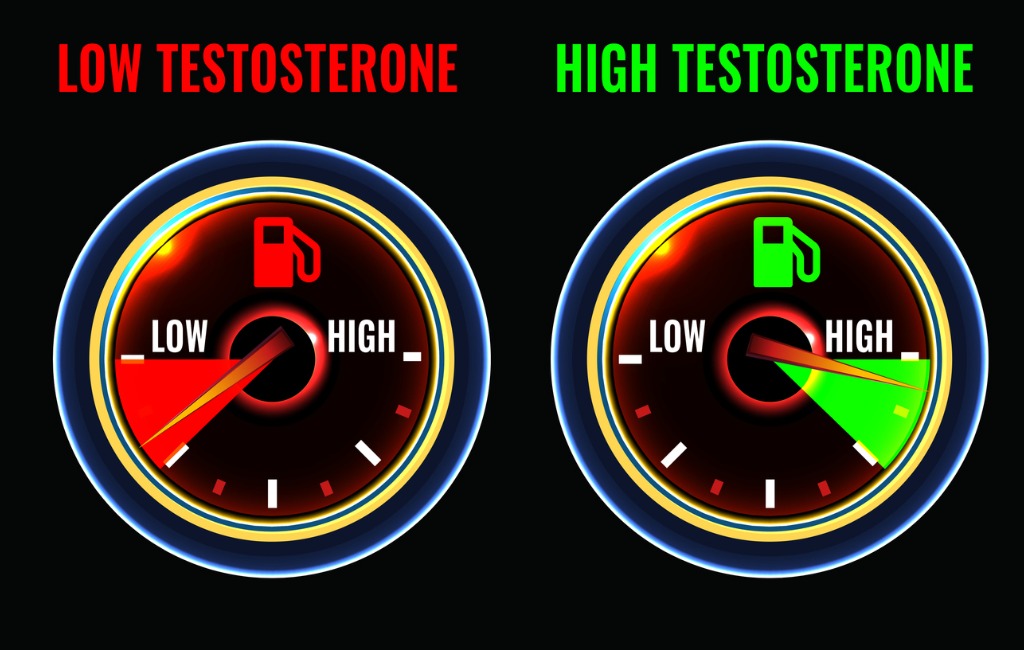Many of you are probably asking what? Why is it so important to write about testosterone? After all, don’t we already know all about it from Dr. Internet? Well, since most athletically inclined individuals seem to be buying tons of supplements from the thousands of companies now selling body-building powders, pills, and other muscle-enhancing products designed to increase testosterone, I think it’s time for an easy-to-understand article presenting the basics of the “Testosterone Angle.”
So please keep reading. The information that follows may just hit the nail on the head when it comes to explaining symptoms that sound like other health problems, but for reasons you don’t understand, they haven’t been resolved. Maybe, just maybe, it’s because you simply have never related your symptoms to “low-T” (low testosterone) or “high-T” (high testosterone). And you say huh?!
As you can well imagine, when you’re involved in the field of nutrition, as am I (albeit semiretired), you come across all sorts of clients with all sorts of physical or mental health conditions. Therefore, it did not surprise me when I eventually found myself working with a client who had an unresolved muscle issue—and that’s when I learned that the hormone testosterone was the key missing element! Hopefully this article will serve as wake-up call to take a closer look at the testosterone angle.
What Exactly Does Testosterone Do?
According to this definition of testosterone, it is “the sex hormone, C19H28O2, secreted by the testes, that stimulates the development of male sex organs, secondary sexual traits, and sperm.”
Nor is testosterone important only in men’s health. In the case of women, as this article from Harvard Health explains, “Testosterone is produced in the ovaries and adrenal gland. It’s one of several androgens (male sex hormones) in females.” This article also states that testosterone has an important effect on women’s health, in particular on ovarian function, bone strength, and—although more research is needed—on female sexual behavior, including normal libido.
Getting Tested for Your Personal Testosterone levels
There are different ways of finding out what your testosterone levels are. My first choice would be to go to your medical doctor or urologist for lab tests, which are often a normal part of a physical exam. Your chiropractor can also easily muscle test for low or high testosterone levels. Additionally, you should be able to find test kits online that allow you to do your own testing at home.
Symptoms Associated with Low-T in Women
The website HGHA.com states that “maintaining adequate testosterone levels in women by age will help keep bones strong, metabolism converting food into energy, brain functions sharp, and the heart healthy.”
They have also compiled the helpful lists of notable symptoms associated with low and high testosterone levels in women, which I have included below.
Symptoms of low-T levels in women:
- Weight gain
- Mood swings
- Loss of lean body mass
- Reduced strength
- Decreased bone density
- Hair loss
- Poor sleep
- Declining memory
- Difficulty with focus and concentration
- Depression
- Low libido
- Hot flashes
Symptoms of high-T levels in women:
- Oily skin or acne
- Loss or thinning of scalp hair, frontal balding
- Enlarged clitoris
- Excess growth of facial hair
- Infertility
- Irregular periods or menstrual cessation
- Deepening of the voice
- Increased muscle mass
Now let’s look at common symptoms of low testosterone levels in men, as compiled by the website Guy Counseling.
Symptoms of low-T levels in men:
- Erectile dysfunction

- Decreased libido
- An increase in abdominal fat
- Decreased muscle mass
- Inability to concentrate
- Mood changes and irritability
- Sleep problems
- Loss of bone mass
- Hot flashes and night sweats in men
- Hair loss
- Decreased sperm count
- Numbness in the genitals
- All-day fatigue
- Problems concentrating
(Personal note: I do not use or recommend any product sold on this website. I include the list above for reference only.)
Next, the website Men’s Hormonal Health has compiled the following list of symptoms experienced by men with abnormally high testosterone levels.
Symptoms of high-T levels in men:
- Acne (primarily on back and shoulders)
- Minor testicle shrinkage (not necessarily a negative)
- Reduced fertility
- Hair loss
- Enlarged prostrate
Tribulus and Weak Muscle Issues
One reason I decided to delve into this subject was my attempt to test and diagnose the cause behind my client’s muscle weakness. I finally decided to consult my favorite chiropractor, Dr. Joe Givan, who closely follows the teachings of Dr. Lowell Keppel. No sooner had I described my client’s symptoms, including weakness in the calf and other leg muscles, than he brought out a bottle of Tribulus from Medi-Herb.
Dr. Givan explained that Tribulus is used to increase the production of testosterone, a deficiency of which is associated with the sensation of extreme muscle weakness. (This may be one possible reason why it is so popular with bodybuilders.) My client has since reported that their muscle weakness is lessening after using Tribulus for about a month.
Naturally you cannot make a good assessment based on just one symptom. A holistic practitioner will consider many symptoms and lifestyle patterns before coming to a conclusion and developing a diet and supplement program. For instance, severe muscle weakness can also indicate a vitamin E complex deficiency. There is a big difference between muscle weakness and muscle wasting, which must be determined before designing a protocol.
The Tribulus Story
The website Tibena offers this brief history of Tribulus (emphasis mine): “Tribulus terrestris was used by traditional, ancient medicine in Greece, China and India (Ayurvedic medicine). Medicinally used for muscle weakness, infertility, impotence, inflammation, arthritis as well as liver, kidneys and heart health. It’s been known to enhance energy, vitality and build lean muscle mass. ‘Tribulus terrestris (family Zygophyllaceae), has been used for a long time in both the Indian and Chinese systems of medicine for treatment of various kinds of diseases.’”
Personal note: Tribulus is one of the main supplements used by bodybuilders. However, what is sold online is no doubt synthetic. I strongly advise using an all-natural, nonchemical product such as Tribulus from Medi-Herb.
Recommended Foods for High-T Levels
An interesting problem related to high levels of testosterone in women (and no doubt in men) is that it can lead to “carbohydrate intolerance,” which in turn can cause “weight gain, insulin resistance, high LDS and low HDL cholesterol levels, raised triglycerides, and high blood pressure.”
So, ladies and gents, you may want to look to at an appropriate diet such as a true ketogenic diet. I say this because there are many pseudo keto diet plans on Dr. Internet that are not as effective as those advocated by Dr. Bruce Fife, ND. I highly recommend The Coconut Ketogenic Diet to get a real understanding of what comprises a true keto diet.
Recommended Foods for Low-T Levels
If you have low-T levels, the website Dr. Axe can be a great guide for learning how to encourage the formation of testosterone. You will find a wealth of information on food group categories, including healthy fats and high-protein foods. And, of course, testosterone-boosting foods, including fermented dairy products (goat milk, kefir, yogurt, raw goat or sheep milk cheese), good oils (coconut oil, avocado, olive oil, among others), and complex carbohydrates (oats, quinoa, barley, and more). Complex carbs are not to be confused with simple carbs such as refined sugars, desserts, and other unhealthy fat-producing foods we should all avoid.
Food supplements from Standard Process to consider:
- Cataplex E: for muscle strength.
- Symplex M (for men) or Symplex F (for women): A protomorphogen combo for support of male and female sex organs and glands.
- Wheat Germ Oil: Carries the sex hormone precursors from which testosterone is made.
Hopefully this post will make a difference in your ongoing quest for a happier, healthier life. And, yes, if you have dreams of slowing the aging process, you can either increase or decrease your testosterone levels with supplements and/or herbs such as Tribulus, as well as a diet high in whole foods, unrefined fats, healthy proteins, and complex carbohydrates.
[xyz-ihs snippet=”Begin-Authors-Note”]Afterthoughts from the Traditional Cook
“In Praise of Muscles”
Make a muscle?
Nonsense!
Only God can make a muscle.
and you can mark me down as grateful
for the ones attached to me!
They’re a curious bunch though:
I say push and they say pull,
I say lift and it’s pull again
but let me pull one
and there’s Hell to pay.
Of course we have steward’s rights
to train and toughen them
to storm up a Chopin Etude
or guide a surgical knife
or we can bulk them up
posing profile to the mirror.
And yes we can fold them into a fist
or extend a welcoming hand.
(the choice is with the steward).
Thank you God for muscles
(dear angels of movement)
but please Sir, can I have some more?
—Robert Charles Howard, May 2008
Disclaimer from Maria Atwood, CNHP: I am a Certified Natural Health Professional (CNHP) not a medical doctor. I do not diagnose, prescribe for, treat, or claim to prevent, mitigate, or cure any human diseases. Please see your medical doctor or health practitioner prior to following any recommendations I make in my blog posts or on my website.
Images from iStock/FXQuadro (main), newannyart (low and high testosterone), Ridofranz (woman holding weights).





